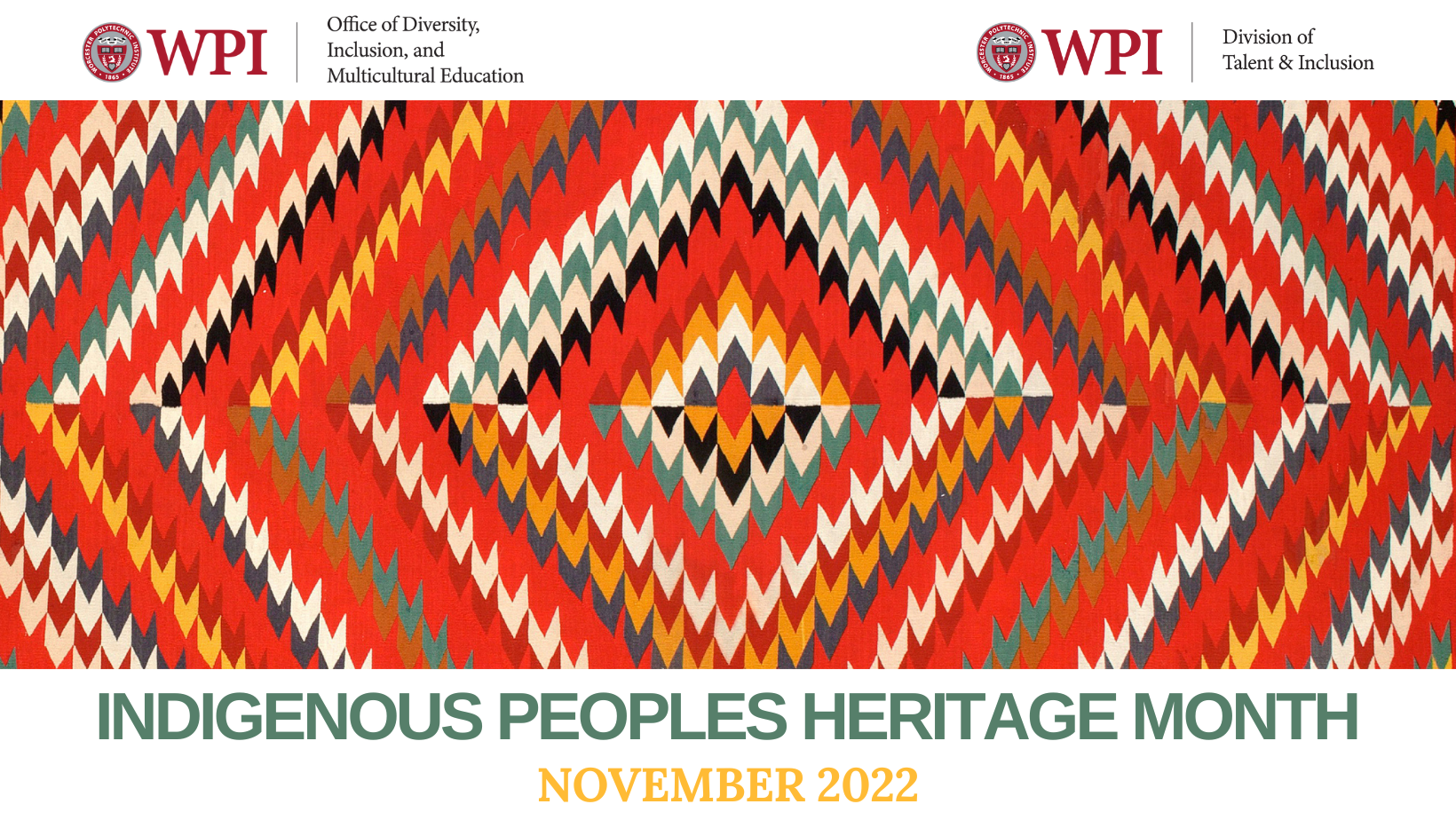WPI Celebrates Indigenous Peoples Heritage Month 2022

Worcester Polytechnic Institute (WPI) celebrates Indigenous Peoples Heritage Month 2022 by honoring and highlighting the diverse culture, heritage, and contributions of Native Americans and Indigenous Peoples throughout history. Indigenous Peoples Heritage Month is nationally recognized and serves as an opportunity to honor and celebrate the traditions, food, art, languages, culture, and stories of Native and Indigenous communities. We encourage our community to study, observe, and celebrate the Native and Indigenous community on campus, within the Worcester community, and beyond.
WPI Land Acknowledgment (Learn More):
WPI acknowledges the painful history of genocide in the U.S. for native and indigenous peoples. As a public statement that honors the indigenous people as native inhabits on this land, WPI honors and respects the many and diverse tribal nations who were forcefully removed from their sacred lands.
WPI would like to recognize the people of the Chaubunagungamaug and Hassanamisco Nipmuc Tribe as the traditional custodians of the land on which we work. We take this moment to honor their elders, past, present, and emerging. WPI strongly advocates for higher education professionals to honor the land, the original tribal occupants, and the history of where they are located.
In Worcester, Massachusetts (USA) we work, learn, live, and thrive on the ancestral homeland of the Nipmuc Indigenous tribe. Learn More
STEM Scholar Highlights:
-
Nicole Aunapu Mann (NASA Astronaut and Mechanical Engineer)
-
Robin Wall Kimmerer (Environmental Biologist and Ecologist)
-
Aaron Yazzie (Mechanical Engineer at NASA’s Jet Propulsion Laboratory)
Read, Watch, Listen, and Learn
-
Explore Gordon Library’s Native and Indigenous Peoples Heritage Month Collection
-
Explore Nipmuc Nation online
-
Explore Telling All Americans’ Stories: Introduction to Indigenous Heritage online
-
Explore Celebrate Native American Heritage Month online
-
Explore the National Museum of the American Indian online
-
Read stories written by Native and Indigenous authors
-
Read 21 things you can do to be more respectful of Native American cultures – Nonprofit AF
-
Watch the 2022 Native Cinema Showcase between Friday, November 18th and Friday, November 25th.
-
An annual celebration of the best in Indigenous film. The online program features 35 films, represents 30 Native nations across the span of 8 countries, and 10 Indigenous languages spoken.
-
Watch Gather documentary (2020)
-
A film that explores the growing movement among Native Americans to reclaim their spiritual, political, and cultural identities through food sovereignty.
-
Watch “Bury My Heart on Wounded Knee” film (2007)
-
Listen to the Native Trailblazers podcast
-
Listen to the Unreserved podcast
-
Listen to the Pow Wow Life podcast
Take Action
-
Attend Traditional Weaving with Elizabeth Perry on Monday, November 7, 2022 at 3:30 PM in the OASIS Multicultural Center (OASIS House) at 20 Schussler Road.
-
Join WPI’s Society for Advancement of Chicanos/Hispanics and Native Americans in Science (SACNAS) Chapter
-
Support the Worcester Inter-Tribal Indian Center
-
Support the Massachusetts Center for Native American Awareness
-
Support the American Indian Science and Engineering Society (AISES)
-
Support Native arts and businesses by buying art, jewelry, clothing, and other items made by Native people and communities.
-
Everything you need to vote. Vote.org
- Become a Poll Worker
Thank you to all of the members of the Indigenous Peoples Heritage Month Planning Committee who made this month possible:
- Brian Chabot (WPI Athletics)
- Amanda Laungani (Career Development Center)
- Alesia LeSane (ODIME)
- Emily O’Brien (Gordon Library)
- Lori Ostapowicz-Critz (Gordon Library)
- Taylor Rohena (Office of Accessibility Services)
- Christine Sharry (Student Activities Office)
"One of the very proponents of an American Indian Day was Dr. Arthur C. Parker, a Seneca Indian, who was the director of the Museum of Arts and Science in Rochester, N.Y. He persuaded the Boy Scouts of America to set aside a day for the “First Americans” and for three years they adopted such a day. In 1915, the annual Congress of the American Indian Association meeting in Lawrence, Kans., formally approved a plan concerning American Indian Day. It directed its president, Rev. Sherman Coolidge, an Arapahoe, to call upon the country to observe such a day. Coolidge issued a proclamation on Sept. 28, 1915, which declared the second Saturday of each May as an American Indian Day and contained the first formal appeal for recognition of Indians as citizens.
The year before this proclamation was issued, Red Fox James, a Blackfoot Indian, rode horseback from state to state seeking approval for a day to honor Indians. On December 14, 1915, he presented the endorsements of 24 state governments at the White House. There is no record, however, of such a national day being proclaimed.
The first American Indian Day in a state was declared on the second Saturday in May 1916 by the governor of New York. Several states celebrate the fourth Friday in September. In Illinois, for example, legislators enacted such a day in 1919. Presently, several states have designated Columbus Day as Native American Day, but it continues to be a day we observe without any recognition as a national legal holiday.
In 1990 President George H. W. Bush approved a joint resolution designating November 1990 “National American Indian Heritage Month.” Similar proclamations, under variants on the name (including “Native American Heritage Month” and “National American Indian and Alaska Native Heritage Month”) have been issued each year since 1994."
Learn More: About National Native American Heritage Month